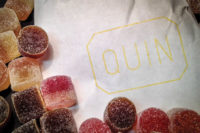
Mark Magers, v.p.-sales for Divine Chocolate, Inc., Washington, D.C.
Not many chocolate companies can claim a direct link to cocoa farmers. Divine Chocolate, however, can. And that’s probably what attracted Mark Magers to join the company in late 2006 as its vice president of sales. Although Magers didn’t have any previous confectionery experience, he knew something about selling gourmet products – he ran sales and marketing for Kauai Coffee Co., the largest coffee grower in the United States – and about working with socially conscious companies – he was v.p. – business development for TransFair USA, the certifying agency for Fair Trade Certified products in the United States.
“So Divine brought those two experiences together in a single opportunity - Fair Trade and working for farmers,” he explains.. “Divine is the only chocolate brand that is owned by cocoa farmers, and our mission is to bring more of the value of their cocoa to the cocoa farmers of Ghana.”
As a result, Magers joined Divine Chocoate in late 2006, the same time the company was incorporating in the United States. Divine Chocolate’s history, however, goes back a few years earlier, deep into the rural cocoa bean growing areas of Ghana.
In 1997, at their annual general meeting, the farmers of Kuapa Kokoo voted to set up a chocolate company of their own in order to return even more benefits to cocoa farmers. And with investment from The Body Shop and Twin Trading, and support from Comic Relief and Christian Aid, Divine Chocolate was born.
“Divine Chocolate is today a leading Fair Trade brand in the U.K. and a pioneer in the world of socially responsible enterprise,” Magers says. “The success of Divine means that farmers have a secure source of Fair Trade income that continues to grow year on year.”
To date, Kuapa Kokoo has invested its Fair Trade income in building schools, sinking wells for clean drinking water to villages, providing mobile medical clinics for farmers in remote growing regions, and fostering women’s income generation projects to help women earn additional income for their families when the cocoa season is over.
“The farmers’ ownership stake in Divine Chocolate means that Kuapa Kokoo has a meaningful input into decisions about how Divine is produced and sold,” he emphasizes. In addition, Kuapa Kokoo receives a share in the profits from their ownership shares and in 2007 celebrated the first distribution of dividends from Divine.
In 2006, Divine Chocolate Inc. opened in Washington, D.C. to bring Fair Trade chocolate to U.S. consumers. The farmers of Kuapa Kokoo own one-third of Divine Chocolate in the United States. Additional investment is provided by Divine Chocolate Ltd. in the U.K., Lutheran World Relief, Oikocredit, and SERRV International.
What did you think you would be when you grew up?
I didn’t really have much of an idea, but the closest thing would be a professional football player.
Name one or some of your favorite movies.
“Monty Python & The Holy Grail” ( for laughs); “12 Angry Men” (I just like it a lot); and “It’s a Wonderful Life” (for perspective).
Describe your perfect dream vacation.
I’d start somewhere in the South Pacific, like the Cook Islands, and experience the culture, the food, and the diving, making a big clockwise circle around Polynesia until I got tired – and that could be a long time!
What book are you currently reading?
“Heal the Ocean” by Rod Fujita.
Aside from a family member, whom would you most want to be stranded with on a deserted island?
MacGyver – that way I wouldn’t go hungry, and I’d have a decent chance of getting back!
What’s your pet peeve?
A lack of awareness of one’s impact on the people and things around you.
I’d give anything to meet:
Joseph Campbell.
The best piece of advice that I’ve gotten:
Treat others the way you want to be treated.
What excites you most about your job?
Knowing that my work directly benefits farmers in Ghana.

